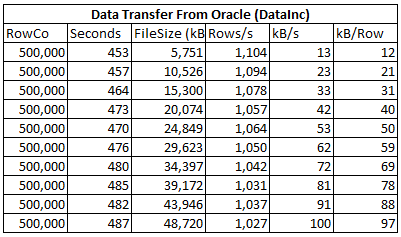Is there a setting in Oracle 11g that can throttle the rows/second being pulled from the db?
Our data loads from Oracle are really slow. It does not seem to matter whether its OPENQUERY, SSIS, or SQL Developer. I ran some tests and found that as the row number increases, the time to transfer increases in a linear fashion (100K rows in 90 seconds, 1M rows in 903 seconds). I then ran another test where the row count remained the same (500K) but the amount of data in each row increased with each trial. For this test, the time was almost flat (~480s), even though the amount of data increased from 5MB to 45MB over 10 trials.
The issue does not seem to be a throughput (VPN tunnel) problem since data speed increased with data/row.
So, my question is, what in Oracle would be causing this consistent 1000 rows/sec value, regardless of the amount of data in each row?
We don't manage the Oracle db, but I'm hoping to go back to the dbas with some ideas to speed up our month end loads.



CREATE TABLEstatement for the target table might shine some light.